
-
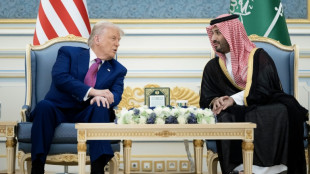 Trump hosts Saudi prince for first time since Khashoggi killing
Trump hosts Saudi prince for first time since Khashoggi killing
-
Tonga's Katoa out of NRL season after brain surgery

-
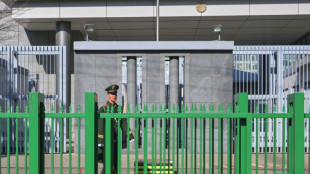 Japan warns citizens in China over safety amid Taiwan row
Japan warns citizens in China over safety amid Taiwan row
-
In Somalia, a shaky front line barely holds back the 'dogs of war'

-
 Shares in 'Baby Shark' studio jump on market debut
Shares in 'Baby Shark' studio jump on market debut
-
Thunder breeze past Pelicans, Pistons overpower Pacers

-
 Grieving Cowboys remember Kneeland, defeat Raiders
Grieving Cowboys remember Kneeland, defeat Raiders
-
Loaf behind bars: Aussie inmate says Vegemite a human right
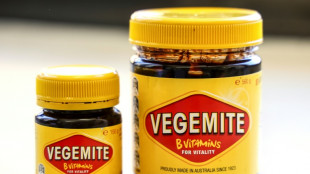
-
 In film's second act, 'Wicked' goes beyond Broadway musical
In film's second act, 'Wicked' goes beyond Broadway musical
-
Asian markets track Wall St down with Nvidia, US jobs in view
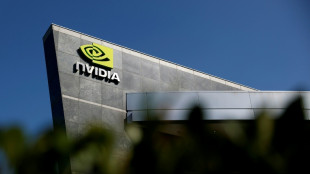
-
 Scott Boland: the best 'spare' fast bowler around
Scott Boland: the best 'spare' fast bowler around
-
Fire and Ashes: England bank on fast bowling barrage in Australia

-
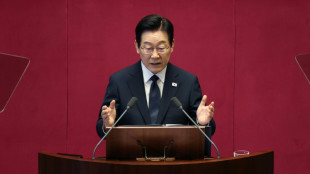 North Korea says Seoul-US sub deal will trigger 'nuclear domino' effect
North Korea says Seoul-US sub deal will trigger 'nuclear domino' effect
-
Education for girls hit hard by India's drying wells

-
 Haitian gangs getting rich off murky market for baby eels
Haitian gangs getting rich off murky market for baby eels
-
Trump says will talk to Venezuela's Maduro, 'OK' with US strikes on Mexico
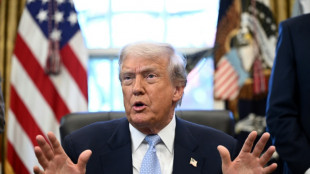
-
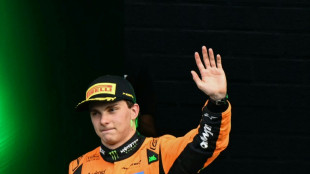 Oscar Piastri wins Australia's top sports honour
Oscar Piastri wins Australia's top sports honour
-
'Severely restricted': Russia's Saint Petersburg faces cultural crackdown
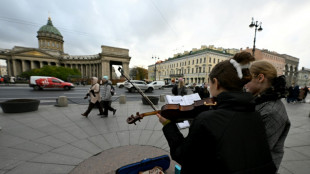
-
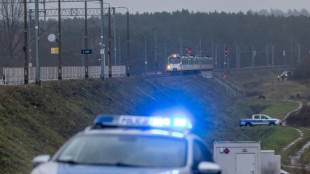 Polish PM denounces 'sabotage' of railway supply line to Ukraine
Polish PM denounces 'sabotage' of railway supply line to Ukraine
-
UK toughens asylum system with radical overhaul
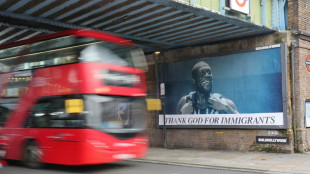
-
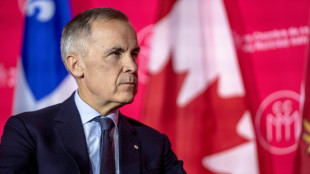 Carney's Liberals pass budget, avoiding snap Canada election
Carney's Liberals pass budget, avoiding snap Canada election
-
LeBron back in training, edges closer to Lakers return

-
 Climate talks run into night as COP30 hosts seek breakthrough
Climate talks run into night as COP30 hosts seek breakthrough
-
Germany and Netherlands lock up World Cup spots in style

-
 Germany's Woltemade hopes for 2026 World Cup spot after scoring again
Germany's Woltemade hopes for 2026 World Cup spot after scoring again
-
Germany 'send message' with Slovakia rout to reach 2026 World Cup

-
 Trump unveils fast-track visas for World Cup ticket holders
Trump unveils fast-track visas for World Cup ticket holders
-
Netherlands qualify for World Cup, Poland in play-offs

-
 Germany crush Slovakia to qualify for 2026 World Cup
Germany crush Slovakia to qualify for 2026 World Cup
-
Stocks gloomy on earnings and tech jitters, US rate worries

-
 'In it to win it': Australia doubles down on climate hosting bid
'In it to win it': Australia doubles down on climate hosting bid
-
Former NFL star Brown could face 30 yrs jail for shooting case: prosecutor

-
 Fate of Canada government hinges on tight budget vote
Fate of Canada government hinges on tight budget vote
-
New research measures how much plastic is lethal for marine life

-
 Mbappe, PSG face off in multi-million lawsuit
Mbappe, PSG face off in multi-million lawsuit
-
EU defends carbon tax as ministers take over COP30 negotiations

-
 McCartney to release silent AI protest song
McCartney to release silent AI protest song
-
Stocks tepid on uncertainty over earnings, tech rally, US rates

-
 Louvre shuts gallery over ceiling safety fears
Louvre shuts gallery over ceiling safety fears
-
'Stranded, stressed' giraffes in Kenya relocated as habitats encroached

-
 US Supreme Court to hear migrant asylum claim case
US Supreme Court to hear migrant asylum claim case
-
Western aid cuts could cause 22.6 million deaths, researchers say

-
 Clarke hails Scotland 'legends' ahead of crunch World Cup qualifier
Clarke hails Scotland 'legends' ahead of crunch World Cup qualifier
-
S.Africa says 'suspicious' flights from Israel show 'agenda to cleanse Palestinians'

-
 South Korea pledges to phase out coal plants at COP30
South Korea pledges to phase out coal plants at COP30
-
Ex-PSG footballer Hamraoui claims 3.5m euros damages against club

-
 Mbappe, PSG in counterclaims worth hundreds of millions
Mbappe, PSG in counterclaims worth hundreds of millions
-
Two newly discovered Bach organ works unveiled in Germany

-
 Stocks lower on uncertainty over earnings, tech rally, US rates
Stocks lower on uncertainty over earnings, tech rally, US rates
-
Barca to make long-awaited Camp Nou return on November 22


Actors union explains AI guardrails in strike deal
From computer-generated "extras" to AI "zombies," new restrictions against the use of artificial intelligence in Hollywood were set out by the actors' union Friday.
The Screen Actors Guild (SAG-AFTRA) reached a deal with studios like Disney and Netflix this week to end its nearly four-month strike. Its board members on Friday voted 86 percent in favor of ratifying the agreement.
Besides a seven percent minimum pay increase, and a new $40-million-per-year fund to transfer a portion of revenues for hit shows from studios to actors, AI guardrails were a key part of talks.
The deal "allows the industry to go forward -- it does not block AI," SAG-AFTRA negotiator Duncan Crabtree-Ireland told a press conference.
"But it makes sure that performers are protected. Their rights to consent are protected. Their rights to fair compensation and their rights to employment are protected."
Studios have been experimenting with AI in recent years, from bringing deceased movie stars back using realistic "digital replicas," to using computer-generated background figures to reduce the number of actors needed for battle scenes.
Many cost-cutting producers want a growing role for AI, and have begun requiring some performers to take part in high-tech 3D "body scans" on set, often without explaining how or when the images will be used.
But now, an actor must be paid the same rate for any use of their digital replica as they would have earned doing the same "amount of work" on set themselves in real life, Crabtree-Ireland said.
Amid fears that background workers -- or "extras" -- could be the first to lose their jobs to AI, strict curbs have been put in place.
"No use of a digital replica can be used to evade engagement and payment of a background actor under this contract," he said.
Studios must gain consent from an actor -- or their estate -- every time their digital replica is used in any film or TV episode.
They cannot present actors with boilerplate contracts entitling them to use a replica in perpetuity, but must instead provide a "reasonably specific description" of how it will be used each time.
- 'Zombies' -
AI technology is advancing at breakneck speed, but has never previously been part of the discussions when SAG-AFTRA renegotiates its contract with studios roughly every three years.
SAG-AFTRA president Fran Drescher said it was vital to nail down rules this time, because "in the world of AI, three months is equivalent to a year."
"So if we didn't get those barricades. What would it be in three years?... It would be so far out of our grasp, we would always be chasing something, but never quite get it."
The very final, contentious detail to be thrashed out with studios on Tuesday night concerned use of AI to create "synthetic fake performers."
Referred to by Variety as "zombies," or "digital Frankensteins," these are constructed using the various body parts of different real actors.
"If you're using Brad Pitt's smile and Jennifer Aniston's eyes, both would have a right of consent," Crabtree-Ireland told the trade website.
He elaborated at Friday's press conference, explaining that studios are now required to obtain permission from every actor whose features are used.
They also have to inform SAG-AFTRA each time a "synthetic fake performer" is created. The union will have the right to bargain for compensation on behalf of the actors involved.
- 'Deal breaker' -
Drescher said AI was a "deal breaker" in the talks, and that the guardrails will not just help actors, but many other entertainment industry professions down the line.
"In a synthetic world, you don't need hair and makeup people. You don't need drivers. You don't need set builders," she said.
"And so for us to keep holding out for the best AI package that we could get was also going to spill over into what their futures were going to look like."
Crabtree-Ireland urged politicians to do more to "make AI protections a priority."
"Our members will be advocating for legislative efforts and will remain actively involved in the movement to protect all individuals' rights to their likeness," he said.
E.Aziz--SF-PST




